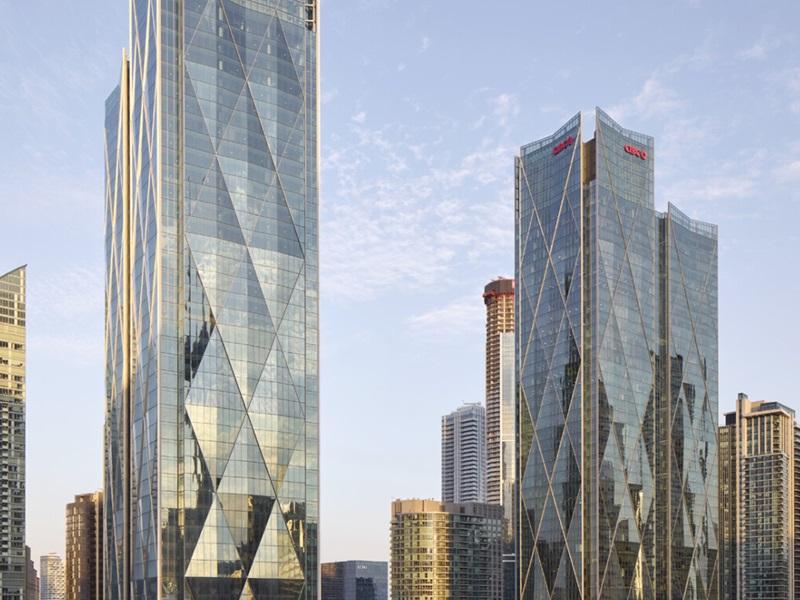
Just blame Canada? Economist Benjamin Tal’s message to over 3,000 attendees at the Real Estate Forum in Toronto on Wednesday suggested that, when it comes to “uncertain” economic conditions we should at least in part, just blame America.
“We are operating in very uncertain times,” Tal told the commercial real estate professionals, gathered for the two-day event at the Metro Toronto Convention Centre, in his annual keynote economic presentation.
The CIBC Capital Markets managing director and deputy chief economist did suggest, however, things are likely not as gloomy as they might appear. Despite the potential impact of heavy tariffs on Canadian goods which incoming U.S. president Donald Trump is threatening to impose, Tal suggests this is a “negotiating tactic” and the worst-case scenario is unlikely.
With our economy already in what he considers a recession - he also suggests inflation is already actually at 1.7 per cent when mortgage carrying costs are stripped out - Tal believes the Bank of Canada must, and will, continue cutting its trend-setting interest rate. This will be good for the commercial real estate industry.
“The Bank of Canada must cut interest rates very rapidly and aggressively,” he said.
“In fact, given where the Canadian economy is, it doesn’t make any difference if you put a monkey in charge to run the Bank of Canada, or somebody else, they would do the same thing. The issue is not Canada, it is the U.S.”
The 10-year bond rate, and TRUMP
He noted a downward trend in U.S. 10-year bond rates - and in long-term Canadian bond rates - which had started in Q2 of this year, suddenly reversed itself in September.
“That’s the wrong direction. The Fed and the Bank of Canada (are cutting interest rates) and the long end of the curve is widening. So the question is why?”
There has been a 60 BPS increase in recent months, which he said is "inconsistent" with today's U.S. economy. He attributes it to what he creatively called the TRUMP factor …
- T - Taxes and tariffs.
- R - Regulations.
- U - undocumented
- M - migrants
- P - protectionism.
But he made a case why he believes this is an overreaction by investment markets.
He said threats to deport millions of undocumented migrants in the U.S. would decimate the workforce, lead to serious wage inflation and cause the economy to “go under.”
While some tariffs might be imposed, he said too many such measures, at too high a rate, would also have a major impact on the U.S. economy, which is already weakening
On concerns about fiscal policy, he believes fears of a massive increase in spending and the U.S. national debt – in the order of US$7 trillion – are also unrealistic because fiscal conservatives in Congress, including many Republicans, won’t allow it.
So, for this and other reasons, Tal said he expects the bond curve to right itself again.
That will be good news for most facets of the commercial real estate industry, which will benefit from a tighter spread between interest rates and bond yields. Lower interest rates will lower investor returns on bonds and other such vehicles, pushing more money back into the CRE sector.
“I believe the U.S. economy will slow down. That will allow The Fed to cut and therefore allow the Bank of Canada to cut. I see the Bank of Canada rate of 2.25 per cent by mid 2025.”
Tal said there will be $370 billion “looking for the exit now. We haven’t seen anything like that in ages.”
Canada's ongoing housing crisis
On the other major issue in the industry today, how to profitably develop the millions of new homes Canada’s growing population demands, Tal said lower interest rates will not be a panacea. Calling housing a “tale of two markets” he noted the low-rise sector remains fairly healthy.
The condo industry is another story. It is “in a recession” especially in markets like Toronto and Vancouver.
“Last year I told you this industry is going to face the most significant test since the ‘91 recession and that is exactly what’s happening,” he said. “This is a recession and you are facing the most significant test since ‘91.”
The only reason the entire economy is not in “full-scale recession”, he said, has been Canada’s immigration.
“Over the course of breakfast, we got 1.2 million people into this country,” he quipped, discussing the federal government’s move to grow the economy through population growth rather than fiscal policy. “This is crazy.”
And those in the industry know it has led to serious problems.
Municipalities need up to a decade of lead time to plan for and create the structure for growth, he noted. Recent cuts to immigration targets will have some impact, but he still believes population growth will continue to exceed government estimates, and thus continue to outstrip housing starts.
With many condo investors on the sidelines, presales have slumped so developers aren't building multifamily condos.
“81 per cent of investors are in negative cash flow. In the past negative cash flow wasn’t a focus . . . because prices were rising. That’s not the case anymore," he said.
Finding the new normal
The situation will right itself, but likely at the cost of higher housing prices when buyers return to the market, and the homes are not there for them to acquire.
“However we are also building nothing. We all know the presale market in Toronto and Vancouver is basically dead, nobody is building anything."
With the ongoing economic uncertainty, unemployment has risen and the length of time people stay jobless has also grown. This also challenges for-sale housing markets.
In the apartment space, he said rent growth has decelerated in part because “this is about affordability,” and most tenants are at the limit of what they can pay. Elevated financing rates and higher construction and materials costs will continue to impact the ability of developers to build - even with government support.
His conclusion? Lower interest rates will be a benefit for the industry, but significant challenges remain.
“Clearly what was normal in the past is not normal in the context of today’s economy.”










